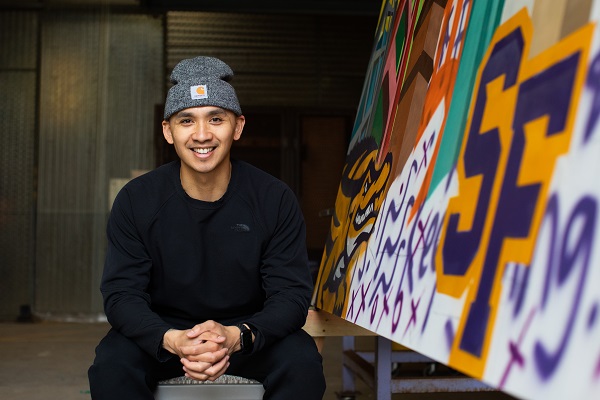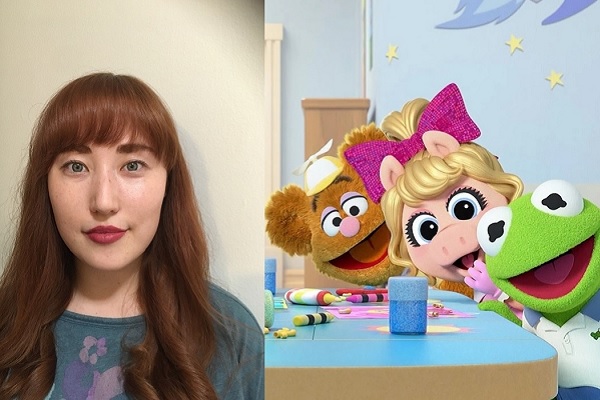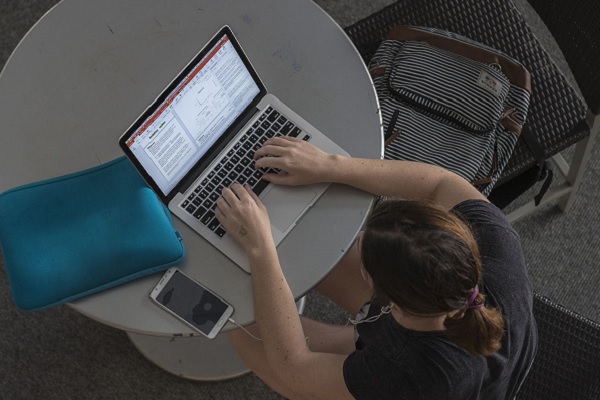News & Announcements

Two SF State-themed murals by Gator artist Jordan Herren (B.S., ’13) have been installed on campus. One, “Chomp City,” can be viewed in the lobby of the Administration building. Another, “We Are SF State,” was signed by campus staff and alumni at an event last August. It is now on display near the first floor lobby of the Student Services Building.
Herren has been making a name for himself as a painter of colorful large-scale murals. His work — often depicting sprawling cityscapes — has livened up the exteriors of the San Francisco bar Badlands, the Toad Hall nightclub and other Bay Area businesses.
Herren returned to campus last summer to paint the murals, and they were unveiled at an employee appreciation event held before the fall semester got underway.
“I always found the tall buildings and architecture of the city to be inspiring and wanted to instill that same energy here,” said Herren, who was born and raised in San Francisco. “Beyond the city is a sunrise/sunset gradient signifying more opportunities ahead. These themes are connected with why we go to school in the first place — to expand our horizons and make a difference in the world.”
Though Herren studied marketing at SF State and worked in the field after graduating, these days he’s able to make his true passion — art — his full-time job.
“It was an awesome experience coming back on campus after all these years later to work as an artist,” he said.

Hanah Lee Cook (B.A., ’15) is a little young for an Emmy winner. In December, the 29-year-old Gator was part of the creative team that landed an award for Outstanding Writing for a Preschool Animated Program for the Disney Junior reboot “Muppet Babies.” But then again Cook had a big head start on success: She’s known she wanted to be a comedy writer since she was in the sixth grade.
“My plan was to Tina Fey my way into the business because it’s tough to break in as an actor,” said Cook (referencing the “30 Rock” actress’ show biz beginnings as a “Saturday Night Live” staff writer).
Cook grew up in sunny Santa Clarita, California, where academics and athletics were heavily emphasized in her home. Yet she stayed fixated on winning laughs rather than trophies.
“I knew I wouldn’t be happy unless I were doing something creative with my day-to-day,” said Cook. “When I applied to SF State, I said, ‘I’m sorry, but I can’t go to this school and not do some form of performing art. … I’m here to make things and have a good time.”
According to Cook, studying theatre and acting at SF State helped with her writing, specifically when she took multiple classes with Laura Wayth, assistant professor of Theatre & Dance.
“Laura Wayth, who teaches acting, was amazing,” said Cook. “I didn’t take a single screenwriting class. I learned how to write by doing the actor paperwork in the acting classes, where we identify what your character wants, what’s in their way and what they’re going to do to try to get it. That taught me how to write a story that’s not just a conversation about a difficult topic between two people.”
Wayth, who started teaching at SF State in 2013, recalls being immediately struck by Cook's creativity, wit and potential.
“She has a very analytical brain and an incredibly wry sense of humor, and those two things combined are stage dynamite that she’s channeled into her writing,” Wayth said.
Upon graduation, Cook started as a production assistant for Warner Bros. Animation. She then held positions at multiple animation companies, including Cartoon Network, as a freelance writer. In 2020, she landed what was supposed to be a six-month job as a staff writer for Disney Television Animation. The supposedly temporary assignment never ended, however, and two and a half years later came the Emmy nomination and win.
Read more about Cook and her rise through the ranks at Disney at SF State News.

SF State has experienced multiple phishing and smishing (scam text message) attacks targeted at faculty, staff and students via compromised University email accounts, email spoofing or SMS messages. As the spring semester begins, Information Technology Services (ITS) would like to spread security awareness to protect our campus community against cybersecurity criminals and approaches. The ITS team knows the importance of your personal information and data, and wants to share situational awareness, information and advisable actions to help keep those safe. Please visit the ITS website for all the details on keeping your privacy private.
Employees can now view their electronic 2022 Form W-2, Wage and Tax Statement as well as prior years’ forms in Cal Employee Connect. The State Controller's Office (SCO) will mail the employee 2022 Form W-2 Wage and Tax Statements no later than Jan. 31, 2023, via the U.S. Postal Service. This included wages paid in 2022 (December 2021 – November 2022 pay periods). W-2s were mailed to the employee’s home address on file as of Dec. 09, 2022. Go to the SCO website for further information regarding how to register for Cal Employee Connect.
A “returned W-2 notification” will be emailed to an employee whose 2022 W-2 was returned to Human Resources.
CSU employees can also log on to Cal Employee Connect (CEC). This portal will allow employees to view and print their earnings statements and W-2s, along with personal information. Helpful tips when signing up for CEC:
- Department: CSU, San Francisco
- Agency code: 255
- Earning Statement (“0” + paycheck number): 0#-###### (any of your SF State payroll check information)
- Total Deduction: Gross pay – Net pay = total deduction
If you don’t have a copy of a paystub on hand you may obtain the paycheck information online at gateway.sfsu.edu. Click “HR Self Service” then “My Paycheck(s)” to view your paycheck information.
Please contact your Department Payroll Representatives if you no longer have access to gateway.sfsu.edu for further instruction on how to obtain the paycheck information.
What do you do if you’ve lost, didn’t receive or need a duplicate/hard copy of your W-2? Go to the SCO website to request a duplicate W-2, wage or tax statement. More than one tax year may be requested; however, only four prior tax years are available. There is a non-refundable $8.50 processing fee per tax year requested. For current active salaried employees, payment for the duplicate Form W-2 may be paid via payroll deduction by checking the appropriate option on Form 436. Once you submit Form 436, the SCO will deduct the fee from your next paycheck.
If you are in one of the following employee categories, you cannot use payroll deduction:
- Student assistants
- Hourly employees
- Special consultants
- Inactive/terminated employees
All payments must be made via a money order or cashier’s check made payable to the State Controller’s Office. Personal checks are not accepted.
View more information on Form W-2 on the SCO website. If you have questions regarding Form W-2 – 2022 Wage and Tax Statement, please contact the payroll representative for your area.
Each year, the Panetta Institute for Public Policy invites CSU presidents to nominate an outstanding undergraduate (junior or senior) student leader from each campus to participate in the fall semester Congressional Internship in Washington, D.C. The fall semester program runs from August through November 2023.
The program is fully funded to allow participation by any qualified student. Students majoring in any subject are eligible to apply and may earn up to 20 semester credits through CSU Monterey for a semester. This internship is a great opportunity for any students who are interested in public policy and looking for professional experience and development.
Students can visit icce.sfsu.edu/panetta for details about upcoming information sessions and SF State’s online application. For any questions, please contact Programs & Outreach Coordinator Kami Yamamoto at kyamamoto1@sfsu.edu.
The CSU Student Research Competition provides a fantastic opportunity for both undergraduate and graduate students to present their scholarship, research projects and creative works to other academics, peers and the community at large. Current students as well as those who graduated in the spring, summer or fall 2022 are eligible. Winners receive cash awards.
Our campus will select up to 10 winners to compete in the CSU system-wide competition hosted by San Diego State University. The SF State campus competition will be held in person from Feb. 27 to March 3. The registration deadline is 5 p.m., Friday, Feb. 10. Students should register via Qualtrics.
The Division of Graduate Studies & Career Development requests that faculty and the academic advising communities help recruit undergraduate and graduate student participants. Please share a new flyer with competition details with your students. The Division of Graduate Studies & Career Development thanks you in advance for your support.
SF State Abroad has a brand-new program database. Students interested in studying abroad during the fall 2023 semester should apply by the Feb. 15 deadline. (The deadline has been moved back for this semester only.) SF State Abroad has programs in 36 countries with options for every major and minor as well as lower and upper GE’s and language-learning programs. Students pay the same tuition and have access to their financial aid while earning SF State resident credit. For more information, check out the SF State Abroad website.
SF State students studying international relations and government studies can now study abroad in India at O.P. Jindal Global University (JGU). This is SF State’s first exchange partner in India. To learn more about SF State Abroad opportunities for students, please visit the SF State Abroad website.
The Academic Senate will meet Tuesday, Jan. 31, from 2 to 4:30 p.m. virtually via Zoom for its eighth meeting of the academic year. Visitors who wish to attend please contact the senate office at senate@sfsu.edu for a Zoom link. The agenda includes:
- Recommendation from the Executive Committee: Resolution in memorial to Dr. Margaret Leahy, consent item.
- Recommendation from the Executive Committee: Updated University Calendar 2023-2024, consent item.
- Recommendation from the Executive Committee: Changes in bylaws to rename Curriculum Review and Approval Committee to Campus Curriculum Committee, allowing CCC to engage in business of the Enrollment Management Committee, and to increase membership in the Student Affairs Committee to include Dean of Division of Undergraduate Education and Academic Planning or designee (ex officio). A change in bylaws requires a 2/3 vote of members present; a quorum is required (50% plus one voting senators must be present), in first reading.
- Recommendation from the Curriculum Review and Approval Committee: International Relations (Distance Education Authorization), in second reading.
- Recommendation from the Curriculum Review and Approval Committee: M.S. in Quantitative Economics (Distance Education Authorization), in second reading.
- Recommendation from the Curriculum Review and Approval Committee: M.A. in Special Education (Distance Education Authorization), in second reading.
- Recommendation from the Faculty Affairs Committee: Tenure Density Policy, in second reading.
- Recommendation from the Academic Policies Committee: Online and Distance Education Policy, in first reading.
- A formal presentation from Senator Robert Keith Collins, Senator Nancy C. Gerber and Senator Darlene Yee-Melichar, ASCSU Report.
The full agenda, meeting materials and minutes can be found on the senate website.
SF State Transforms will host a Spring 2023 Faculty Scholars’ Writing Meet-up twice a month. Join structured writing check-ins and quiet time and report back with faculty peers. This writing workshop is part of Transforms’ continued efforts to create greater faculty scholarship on campus. Please mark your calendars for group writing time with other faculty members. Faculty Scholars’ Writing Meet-Ups are scheduled for February, March, April and May at 1 – 3 p.m. on the first Tuesday and third Friday of each month in the University Library, 2nd Floor Library Learning and Teaching Commons. Sessions will be hybrid: in person and on Zoom.
For information contact Ilse Gonzalez at transforms@sfsu.edu. If you are attending via Zoom please RSVP using Qualtrics.
Human Resources Professional Development invites all SF State employees to attend a CSU’s Got Talent live webcast, “Overcoming the Imposter: Silence Your Inner Critic & Lead with Confidence,” 10 – 11 a.m. Wednesday, Feb. 22. The webcast will be presented by Kris Kelso, executive coach, author and keynote speaker. Register online to access the webinar via Zoom.
February is Financial Aid Awareness Month, and the Office of Student Financial Aid is offering online information sessions throughout the month to celebrate and promote financial aid awareness and encourage students to complete their financial aid application (FAFSA/CADAA) by the March 2 priority deadline. Topics include completing a financial aid application, financial wellness, scholarships, studying abroad with financial aid, basic needs resources and more. Go to the Office of Student Financial Aid website for a schedule of events.
Spotlight
With Lunar New Year underway, Asian American Studies Professor Jonathan Lee discussed the Year of the Rabbit with NBC News on Jan. 20.
“There is a lot of possibility for prosperity and flourishing, and for peace, really,” he said. “The rabbit is a very strong symbol for peace. … This year is maybe calling upon us to be more outward thinking. What do others around me need? What does my community need? What does my country need? How can I make myself of service to my community?”
An essay by Child and Adolescent Development Lecturer Jennifer Arin is featured in the Chronicle of Higher Education’s book “The Future of Academic Advising: Strategies for Student Success,” published December 2022. The essay, titled “The Missing Perspective in Academic Advising: The Faculty Perspective,” was first published in the Chronicle of Higher Education in August 2021.
Arin will moderate a panel at the National Academic Advising Association (NACADA) conference, scheduled for Feb. 27 – March 1, with the co-editor of the NACADA publication Advising is Forever, which published an essay by Arin titled “Diplomacy, Head Butts and a Proverb’s Wise Counsel.”
In a Jan. 19 story in Woman’s World, Recreation, Parks and Tourism Professor Erik Peper explains how using a smartphone makes people less happy.
“Our research shows that people looking down at their device have a much harder time evoking a positive, hopeful memory than people looking up,” he said. “Putting ourselves in this hunched body position makes us feel less optimistic.”
Faculty from the Special Education Department and the School of Social Work collaborated on a book chapter published in January. Assistant Professor Maryssa Mitsch, Lecturer Brett Collins, Associate Professor Amber Friesen and Associate Professor Jocelyn Hermoso wrote “Social Emotional Development and Mental Health: Special Education and Social Work Interdisciplinary Collaboration” in “Handbook of Research on Interdisciplinary Preparation for Equitable Special Education,” edited by Dean D. Slanda and Lindsey Pike.
The chapter reviews the intersection of early childhood special education and social work pedagogy and personnel training. The chapter includes a discussion of the $1.1 million federal personnel preparation grant, awarded to SF State’s Early Childhood Special Education and Social Work programs, Project ARISE (Adversity and Resiliency Interventions for Social Emotional Development in Early Childhood) for 2022 – 2027. The authors advocate for interdisciplinary training for personnel and a whole child approach to working with infants, toddlers and young children with disabilities and their families.
Assistant Professor of Physical Therapy Casey Nesbit and Doctor of Physical Therapy students Fernando Cazares, Kelsey Hargrove and Chelsea Owens recently visited Namitete, Malawi, to provide education and training in rehabilitation skills and blood-pressure monitoring to 60 community health workers. They also trained nurses and doctors at St. Gabriel’s Hospital in principles of mobility for common conditions in the acute care setting.
The team from the SFSU/UCSF Graduate Program in Physical Therapy collaborated with the coordinators of the home-based palliative care program, hospital director and administrators, a local rehabilitation technician and the leaders of the community health workers to provide the training program and physical therapy services grounded in cultural responsiveness.
Associate Professor of Kinesiology Jimmy Bagley, along with Andrew Galpin of CSU Fullerton and Kevin Murach of the University of Arkansas, published “Busting muscle myths” in The Biochemist on Dec. 22. The article discusses the latest research addressing common muscle myths and misconceptions.
On Jan. 18, Professor of Public Administration Sheldon Gen moderated an online panel of participants of the United Nations’ most recent Conference of the Parties (COP) meetings on climate action and biodiversity conservation. Panelists included leaders from the Indigenous Environmental Alliance, International Union for Conservation of Nature, Well Done Foundation and Point Blue Conservation Science.
Professor and Chair of Sociology and Sexuality Studies Andreana Clay moderated “Slanguage: The art and language of Hip Hop,” a talk with hip-hop artists Troy Lamarr Chew II and Sickamore on Jan. 21. The event is part of the FOG Design+Art fair at Fort Mason in San Francisco.
The talk explores the way the originators of hip-hop developed specific, coded language to communicate shared experiences and the way slang commonly functions within alternative cultures. Chew’s work looks methodically at systems of coded communication and how this is translated and mistranslated both within the African diaspora and throughout the mainstream, while Sickamore seeks to elevate the art of hip-hop and bring attention to young artists. Both Chew and Sickamore challenge the ongoing erasure and co-opting of crucial social histories, creating safe spaces for language and culture to thrive.